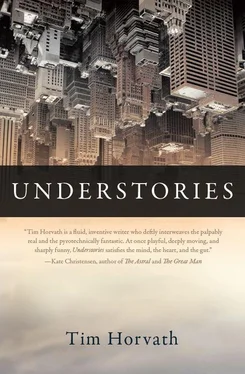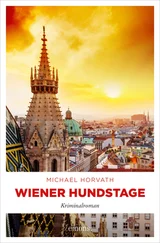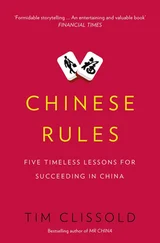Past Xtown sprawled the Memorial District, a veritable city unto itself. Here they showed solely home movies of the dead, and it was transfixing simply to stand here, taking in snippets of life, candid moments — a steaming blueberry pie outheld, a frilly bikini making its beach debut, gentle ribbing about an old clunker. Only the wealthy got their own walls; for most, an hour if they were lucky, and you learned to time your paying of respects, developed a fondness for the spirits who shared that brick space with your loves. Visiting his own dad’s four-minute, thirty-seven-second wall, he’d been struck at various times by:
— his dad’s gangliness as he held Wes aloft at the beach and did voice-overs of some encounter between Wes and a dauntless gull
— how even in this joy his expression was sad, as if he knew
— though they never spoke, the mourner who came after him, a woman whose age he could never place, who’d lift her black veil only in the blank seconds before her own father or husband came on, then lower it immediately after, like a curtain
— the awareness that the moths who’d brought him such comfort as an infant had been dead, allowed to live again only as long as the film played
— the notion that one day the Memorial District would run out of walls
Now he crossed in front of some fire-spitting cyborg that appeared to be taking on a meteor shower with its fists, and he was filled with a surge of pity for the genre junkies, strung out on one block, the ones who OD’d on these sci-fi films nightly, or who dieted on a steady intake of chick flicks, or those who pitched camp on Lynch Row, imbibing Mulholland Drive for time umpteen (by sheer repetition it would come to make sense and ordinary vision go bent and surreal). Even now he would cross midstreet if he got too close to the horrormongers, their eyes fat with blood like sated ticks, their ears echo chambers of screams, their skin scabrous. They looked like they’d come right off the screen and would keep coming at you. A bit wiser than his teenage self, he realized that many of them scraped by as extras by day and just didn’t bother stripping off their makeup.
That you could live here and know only your own kind, rarely venturing beyond your own neighborhood. . it amazed him, peripatetic who assumed that the city was sprawled out for him, a thousand gifts waiting for his tearing hand. Nowadays, he shuttled mainly between two booths, but at his core he was promiscuous, wanting it all. With films, that is; no such temptation with women, eyes for Inez alone, minus the occasional glance at a union meeting toward Daniella Riordan.

No question this walkout would cost him. His job was probably history. Maybe he could plead with Hatcher, but likely not. At the intersection he paused at the “Don’t Walk” clip with renewed appreciation for the footage of the guy waiting at a corner, his comical watch consultation and eye roll. More than a minor celebrity, “Don’t Walk Guy” was an existential hero. His “Walk” counterpart, who burst blithely into the intersection, was tougher to find abiding human connection with. When his clip came on, Wes simply crossed.
No, there was no going back. The very thought should have been terrifying, maybe a little exhilarating, but all he could feel was numbness. No longer was he that teenager. He wanted the allure of what beckoned around the corner, but he could only feel Inez’s image behind, before, around him, her pale body, expansive, folded over edges, rooftops, fire escapes, exposed from angles that only he and a couple of others had ever laid eyes on. Till now.
He rehearsed what he might say, tried out lines. “If you’d only told me. .” “One nude scene, no big. .” “So I’m a stepping-stone. .” “I feel . .” “Fuck. .” Outrage felt warranted but pointless. Saintly understanding rang hollow. Blood pounded in his skull. Maybe what cinaddicts felt, withdrawing. He felt his mental screen fracturing: It split, splintered — quadrants, ninths, shards. In one corner he had her by the wrist, in another stared her down, insouciant in the face of her confession; in one they were figuring things out. In one scene he entered, drew, and fired three bullets into her chest and watched the sheets absorb her blood, and in another he let her discover him screwing Daniella Riordan in his booth; in one he was loading his stuff onto a moving truck and in another he had her hauling hers up and in another she was weeping and begging forgiveness and in another she was even now with him, the other one — another begging — he who’d been visible mere moments ago on his own screen, a place as intimate in its way as his bed, and Wes recognized him at last, some producer she’d introduced him to once. Now he replayed the scene, foreign shadows slithering across her body’s dunes, but this time his own entered and intervened, and she clutched at the sheets in the universal gesture of the caught, and the film went on with him in it but he couldn’t see what happened next.

He needed a blank wall. A wall without image was a wall wanting image was a wall potentially anything. A wall was a screen was naked was stripped down was calling, calling for colored ions to dance up and down it, lick it caress it make love to it. Behold the naked wall. The wall without image, rare enough in Palamoa that it bore an element of eros, like women’s flesh in Muslim countries. A wall was a wrist, an ankle, a filament of flesh, an object of longing and craving, something with which one might have a brush but never possess.

The rain felt well timed, bracing. Maybe he’d been dozing through the relationship of late. Dots were there for the connecting. All along, he should have foreseen her betrayal. Clues peppered everything down to their jokes, obvious jokes, obvious clues. He, she claimed, was the stereotype of a projectionist: aloof, holding himself at a distance, never taking action, never revealing anything significant about himself and projecting — of course — onto others: accusations, quibbles, warts — able to see himself only via others. And he played into it, too—“Or maybe I’m just projecting here,” he would say, rolling his eyes at the lameness even while conceding its likelihood.
No kid dreamed of becoming a projectionist. It was akin to dreaming of becoming the person who cleans the space suits. Nah, the kid wants to be the astronaut, free-floating from a tether, waving to the marble world, next in peril, oxygen dwindling, some critical part burned to a crisp and the world holding its breath. The kid wants to be aboard the Apollo 13, second wants to be the actor, third to direct it, fourth do the makeup, fifth to hold the lights, tied with fifth to screen the film, tied with fetching water for the actors.
Always, she’d assumed she’d wake up next to a filmmaker someday, thought this whole projecting gig was one long temp job. And for a while he’d talked about going back to school. But it hadn’t happened. Over time, he’d come to embody projectionism, fused with his projectors in a sort of Buddhist oneness. Some might have been ashamed of the job, but not Wes. He embraced it, went as far with it as you could go. Not just anyone could land a job at 1.2.1, right smack downtown against the smooth side of an old granary with the antiquated equipment, antiquated except that it was the only stuff that could really do the job, which he’d tell you about if you had an hour and nowhere to be. Did you know there were anywhere between three and nine (nine!) reels that had to be loaded on to get through the film? Did you know those things weighed ten pounds, that he had to carry six at once sometimes; who needed a gym? Or that Wes had two blocks and had worked five once when some exotic flu was going around? Anyone could operate the digital stuff, be a robot like the automated system they tried to replace them with every few years, but it took a special breed to do what Wes did. He mixed films into one another like a DJ, blending them together, running closing credits into opening ones, dissolving like his hands were acid. One night he took a nature documentary and draped it, like sheer fabric, over a thriller about investment bankers. The sharks, gray apparitions too long deprived of sun, wended their way through cubicles as if the office had just that day filled with water. Was that plankton in the vending machines? Marvelous.
Читать дальше













